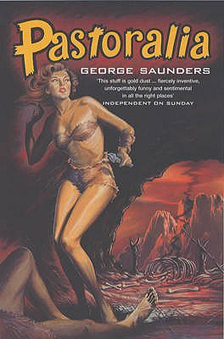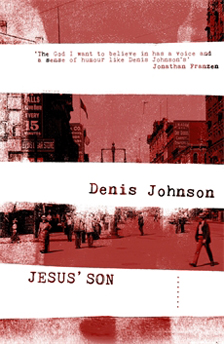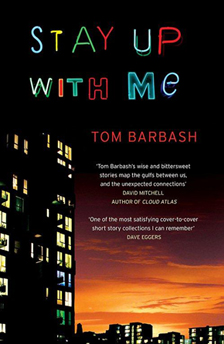Observers and dreamers
by Tom BarbashWe gave Tom Barbash the task of winnowing down his ten favourite short stories. “Impossible,” he countered, “but here are some great ones that came to mind.”
Alice Munro: ‘Chance’
A young woman on a cross-country train trip decides to decline polite conversation with an affable stranger. From this seemingly minor moment a series of happenings occur, a death, a new attraction, a change in life’s course. Juliet is such a complicated mixture of traits, both clever and clueless. We are as readers always off balance in this story, all the way to its perfect end. I remember vividly reading the stories ‘Chance’, ‘Soon’, and ‘Silence’, (one of the saddest stories you’ll ever read), all about the same character, Juliet, on one cross-country plane trip. They were all in the same issue of The New Yorker.
 George Saunders: ‘Winky’
George Saunders: ‘Winky’
The story begins with signature George Saunders absurdist humour – a self-help seminar with comical simplistic lessons, the most relevant for our protagonist concerns his daily oatmeal:
“Now, if someone came up and crapped in your nice warm oatmeal, what would you say? Would you say: ‘Wow, super, thanks, please continue crapping in my oatmeal’? Am I being silly? I’m being a little silly. But guess what, in real life people come up and crap in your oatmeal all the time – friends, co-workers, loved ones, even your kids, especially your kids!”
What I love about this, and other Saunders stories, is where such a wildly funny tale ends up. ‘Winky’ is about basic human subjects – loyalty, resentment, love, and thwarted dreams. Winky has her say in the story too, and the jump in point of view spins the story around to devastating effect.
A.M. Homes: ‘Brother on a Sunday’
You think you know where this story is going: middle-aged plastic surgeon in the Hamptons, a crowd of vain New Yorkers gathering on a beach and in pricey restaurants. But the narrator isn’t at all what you expect, and nor is the heart of this knockout story. There is traditional A.M. Homes dark territory here, but there’s much about goodness and decency, and proper score-settling too. It’s also very funny.
James Lasdun: ‘The Natural Order’
A dark story about male friendship, and that’s stretching the word because there’s little that’s friendly between these two travel mates, sharing hotel suites as they voyage around to exotic locales. There’s an amazing passage in which the married friend spots the toiletries of his single lothario friend and feels powerfully and irrevocably diminished. He responds by testing his powers with women in personally destructive ways. I loved the surprises in the story, and the way the possessor of a reasonable mind can take a wrong turn despite the clearly marked road signs.
John Cheever: ‘The Country Husband’
The protagonist Francis Weed, having barely survived his flight from Minneapolis to New York – which involves a harrowing emergency landing – finds himself unable to command the attention of his wife and kids to tell them of his brush with mortality. He then drops into a spiralling stretch of bad behaviour and thrillingly rebellious thoughts that threaten his family’s place in his respectable suburban town. He chases the babysitter, insults a stuffy neighbour, and finds himself lost. The language in the story is beautiful, the psychology exquisitely rendered, the balance of humour and sadness perfect as only Cheever can do.
Dan Chaon: ‘The Bees’
A young father, a son with night terrors. Secrets in a marriage. Fires. A literary horror tale written by a master of the short form. The story was commissioned by Michael Chabon who asked for literary writers to move into the world of scary tales. Chaon was the perfect choice. Among the Missing, Fitting Ends, and Stay Awake are three remarkable collections.
 Denis Johnson: ‘Work’
Denis Johnson: ‘Work’
Or I might have said, ‘Dirty Wedding’ or ‘Emergency’ or almost any story in Jesus’ Son. But there’s something both fierce and tender in ‘Work’, an eye for beauty when the chips are down so low you can’t pay the rent and you need to rely on the mother-like kindness of a barmaid, or of a day’s work. Read Johnson for the language, the daring flips and turns, the spare style, the sense that a moment of genuine wonder might be worth a year or two of pain.
James Salter: ‘Last Night’
The less said the better on this one, although it is about a woman dying, love, sorrow and regret. Dusk is also a beautiful collection from this great writer of prose. But ‘Last Night’ will stay with you a long, long time, I can guarantee you. Here from the story’s first page:
“It was the night they had decided would be the one. On a saucer in the refrigerator, the syringe lay. Her doctor had supplied the contents. But a farewell dinner first, if she were able. It should not be just the two of them, Marit had said. Her instinct.”
The friend they ask is named Susannah, who “looked like the daughter of a professor or banker, slightly errant. Dirty girl, one of their friends had commented about her, with a degree of admiration.”
Jose Luis Borges: ‘Shakespeare’s Memory’ and T.C. Boyle: ‘Tooth and Claw’
Two of my favourite stories are about men winning, or simply receiving life-changing possessions at a bar. In Boyle’s story, it is a tiger-like animal, a serval, complete with lethal claws and teeth, and in Borges’ beloved tale it’s the Bard of Avon’s memory. Boyle’s lonely protagonist tries to create a family with his would-be bartender girlfriend, while the creature hidden in his bedroom begins to scratch and claw like a neglected monster child; Borges’ Shakespeare scholar Hermann Sorel finds Shakespeare’s memories drowning his own. And he lacks the talent to do much with such rich raw material. Says Borges:
“Chance, or fate, dealt Shakespeare those trivial terrible things that all men know; it was his gift to be able to transmute them into fables, into characters that were much more alive than the grey man who dreamed them.”
 Tom Barbash is the author of the award-winning novel The Last Good Chance and the non-fiction New York Times bestseller On Top of the World. His stories and articles have been published in Tin House, McSweeney’s, Virginia Quarterly Review and other publications. He lives in Marin County and teaches in the MFA programme at California College of the Arts. His story collection Stay Up with Me is published by Simon & Schuster. Read more.
Tom Barbash is the author of the award-winning novel The Last Good Chance and the non-fiction New York Times bestseller On Top of the World. His stories and articles have been published in Tin House, McSweeney’s, Virginia Quarterly Review and other publications. He lives in Marin County and teaches in the MFA programme at California College of the Arts. His story collection Stay Up with Me is published by Simon & Schuster. Read more.
Author portrait © Sven Wiederholt

